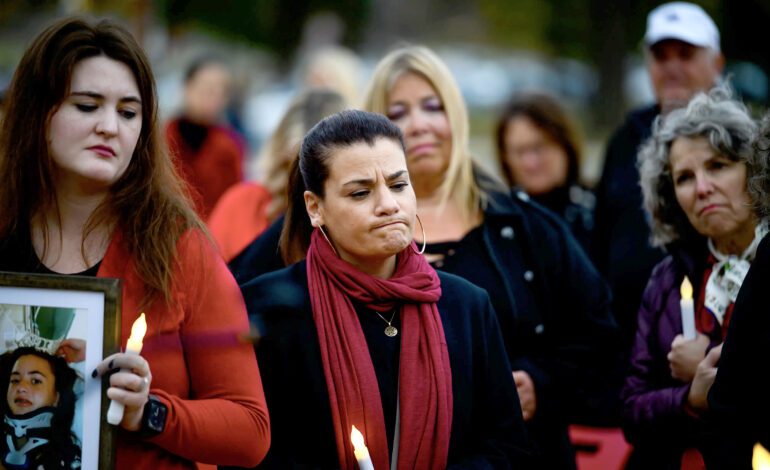WASHINGTON, D.C. – In a push to expedite the implementation of new legislation aimed at preventing drunk drivers from operating vehicles, activist Rana Abbas Taylor from Michigan joined a sit-in alongside members of Mothers Against Drunk Driving (MADD) and U.S. lawmakers. The group urged swift enforcement of the new law, set to take effect in 2026, but currently facing obstacles that could lead to delays.
The legislation, known as the HALT Act (Honoring Abbas Family Legacy to Terminate Drunk Driving), mandates that automakers in the U.S. equip new car models with devices to measure the driver’s blood alcohol level before allowing their vehicle to start. Despite the law passed by Congress in 2021 — proposed by U.S. Rep. Debbie Dingell (D-Ann Arbor) — and providing a five-year timeline for drafting the necessary regulations, implementation by the 2026 deadline remains uncertain. Automakers have cited various challenges as reasons for delays.
To advocate for faster action, a candlelight vigil took place outside the Capitol in Washington, D.C. on Tuesday evening. Participants lit thousands of candles to honor the lives lost to drunk driving, with participation from lawmakers and families who have lost loved ones to drunk drivers. The attendees included Lebanese American activist Rana Abbas Taylor, who lost her sister, brother-in-law and their three children in a horrific crash on their way back to Dearborn from a family vacation in Florida on January 6, 2019. A drunk driver traveling the wrong way on Interstate 75 in Kentucky struck their vehicle, killing them all.
Abbas Taylor spoke about the difficulty of coping with her family’s loss, even after all these years, and stressed that her involvement in advocating for the new law aims to save lives.
The National Highway Traffic Safety Administration (NHTSA) reports that approximately 37 people die daily in the U.S. due to alcohol-related traffic incidents.
“Every 78 seconds, someone is injured or killed because of a drunk driver,” Abbas Taylor said. “When we hear that we may need three more years to implement the law, that means we’re waiting for another 30,000 deaths before using the available technology. That’s unacceptable.”
She called on the NHTSA, automakers and the U.S. Department of Transportation to prioritize this matter.
“We shared life together,” she said. “We lived just three streets apart. We were part of each other’s daily lives. My sister was a respected doctor and my brother-in-law was a respected attorney. They were deeply involved in the community, and even today, we continue to feel the impact of that loss.”
Since the tragic day nearly six years ago, Abbas Taylor has been actively involved in efforts to prevent similar tragedies from affecting other families. She has collaborated with members of Congress, including Dingell and U.S. Rep. Rashida Tlaib (D-Detroit), both of whom attended the vigil in Washington.
Abbas Taylor expressed concern about the slow progress in implementing the law, which was passed three years ago, and hoped the candlelight vigil would draw attention to the issue and ensure it crosses the finish line.
“There’s so much technology available now — safety features that can work in tandem with other systems to create a device that can be integrated into vehicles to protect drivers and help prevent the devastating accidents that have affected hundreds, if not thousands, of families across the United States,” she said.
The HALT Act builds on decades of advocacy by organizations like MADD, which have long pushed for stricter measures to address impaired driving, including the adoption of technologies such as driver monitoring systems, passive alcohol sensors and AI-based vehicle control systems. These systems could prevent a drunk driver from even starting the vehicle, significantly reducing road fatalities.
In addition to drunk driving, Abbas Taylor emphasized the need to address other dangerous behaviors on the road, such as distracted driving and drug-impaired driving, which also claim thousands of lives each year. She advocated for comprehensive measures that include public awareness campaigns, stricter penalties and better support for families affected by these tragedies.
During the vigil, Rep. Dingell, who represented Dearborn at the time of the Abbas family tragedy, remembered the late couple and their three children. She affirmed that their loss motivated her to introduce the HALT Act, ensuring the use of available technology to prevent such incidents.
Rep. Tlaib added that the loss of the Abbas family highlights the urgency of bipartisan cooperation in addressing public safety issues.
“This is not a political issue — this is about saving lives and protecting families,” she said.






Leave a Reply